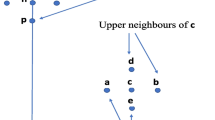Abstract
This paper focuses on product form and related tractable stationary distributions in a general class of stochastic networks with finite numbers of nodes such that their network states are changed through signal transfers as well as internal transitions. Signals may be customers in traditional queueing applications, but we do not make any restriction on their effects at departing as well as arriving nodes. They may also instantaneously move around among different nodes. Furthermore, signal routing may depend on the whole network state. For analytical simplicity, we assume that the state space is countable. For such a network, we propose an abstract model, called a stochastic transfer network, and consider the stationary distribution of the network state. We introduce conditional traffic rates for arrivals and departures. Using them, we consider when the network has product form or some other tractable stationary distributions.
Similar content being viewed by others
References
F. Baskett, K.M. Chandy, R.R. Muntz and F.G. Palacios, Open, closed and mixed networks of queues with different classes of customers, J. ACM 22 (1975) 248–260.
S.A. Berezner, C.F. Kriel and A.E. Krzesiski, Quasi-reversible multiclass queues with order independent departure rates, Queueing Systems 19 (1995) 345–359.
R.J. Boucherie and N.M. van Dijk, Product forms for queueing networks with state-dependent multiple job transitions, Adv. in Appl. Probab. 23 (1991) 1520–187.
X. Chao, A note on queueing networks with signals and random triggering times, Probab. Engrg. Inform. Sci. 8 (1994) 213–219.
X. Chao, Networks of queues with customers, signals and arbitrary service time distributions, Oper. Res. 43 (1995) 537–544.
X. Chao and M. Miyazawa, Queueing networks with instantaneous movements: A coupling approach by quasi-reversibility, Adv. in Appl. Probab. 32 (2000) 284–313.
X. Chao, M. Miyazawa and M. Pinedo, Queueing Networks, Customers, Signals and Product Form (Wiley, Chichester, 1999).
X. Chao, M. Miyazawa, R. Serfozo and H. Takada, Markov network processes with product form stationary distributions, Queueing Systems 28 (1998) 377–403.
X. Chao and M. Pinedo, On generalized networks of queues with positive and negative arrivals, Probab. Engrg. Inform. Sci. 7 (1993) 301–334.
E. Gelenbe, Product-form queueing networks with negative and positive customers, J. Appl. Probab. 28 (1991) 656–663.
E. Gelenbe, G-networks with signals and batch removal, Probab. Engr. Inform. Sci. 7 (1993) 335–342.
E. Gelenbe, G-networks with triggered customer movement, J. Appl. Probab. 30 (1993) 742–748.
W. Henderson, B.S Northcote and P.G. Taylor, State-dependent signaling in queueing networks, Adv. in Appl. Probab. 26 (1994) 436–455.
W. Henderson and P.G. Taylor, Product form in networks of queues with batch arrivals and batch services, Queueing Systems 6 (1990) 71–88.
W. Henderson and P.G. Taylor, State-dependent coupling of quasi-reversible nodes, to appear in this special issue of Queueing Systems (2001).
J.R. Jackson, Networks of waiting lines, Oper. Res. 5 (1957) 518–521.
F.P. Kelly, Reversibility and Stochastic Networks (Wiley, New York, 1979).
Y.V. Malinkovsky, A criterion for pointwise independence of states of units in an open stationary Markov queueing network with one class of customers, Theory Probab. Appl. 35(4) (1990) 797–802.
M. Miyazawa, Insensitivity and product-form decomposability of reallocatable GSMP, Adv. in Appl. Probab. 25 (1993) 415–437.
M. Miyazawa, Structure-reversibility and departure functions of queueing networks with batch movements and state dependent routing, Queueing Systems 25 (1997) 45–75.
M. Miyazawa, Reallocatable GSMP with sequentially dependent lifetimes: Clock-wise decomposability and its applications, in: Applied Probability and Stochastic Processes, eds. J.G. Shanthikumar and U. Sumita (Kluwer Academic, Boston, 1999) pp. 149–172.
M. Miyazawa and X. Chao, Generating a queueing network with signals and state dependent local transitions from a quasi-reversible network, in: Proc. of Performance Evaluations of Information Networks, Hamanako (January 1999).
M. Miyazawa and P.G. Taylor, A geometric product-form distribution for a queueing network with nonstandard batch arrivals and batch transfers, Adv. in Appl. Probab. 29 (1997) 523–544.
M. Miyazawa and R.W. Wolff, Symmetric queues with batch departures and their networks, Adv. in Appl. Probab. 28 (1996) 308–326.
R.F. Serfozo,Markovian network processes: Congestion-dependent routing and processing, Queueing Systems 5 (1989) 5–36.
R.F. Serfozo, Reversibility and compound birth-death and migration processes, in: Queueing and Related Models (Oxford Univ. Press, Oxford, 1992) pp. 65–90.
R.F. Serfozo, Queueing networks with dependent nodes and concurrent movements, Queueing Systems 13 (1993) 143–182.
R.F. Serfozo, Introduction to Stochastic Networks (Springer, New York, 1999).
R.F. Serfozo and B. Yang, Markov network processes with string transitions, Ann. Appl. Probab. 8 (1988) 793–821.
H. Takada and M. Miyazawa, Necessary and sufficient conditions for product-form queueing networks, Research report, Science University of Tokyo, (1997).
N.M. van Dijk, Queueing Networks and Product Forms: A Systems Approach (Prentice-Hall, Englewood Cliffs, NJ, 1993).
Author information
Authors and Affiliations
Rights and permissions
About this article
Cite this article
Miyazawa, M., Takada, H. Traffic Flows and Product Form Solutions in Stochastic Transfer Networks. Queueing Systems 37, 199–232 (2001). https://doi.org/10.1023/A:1011000502674
Issue Date:
DOI: https://doi.org/10.1023/A:1011000502674



